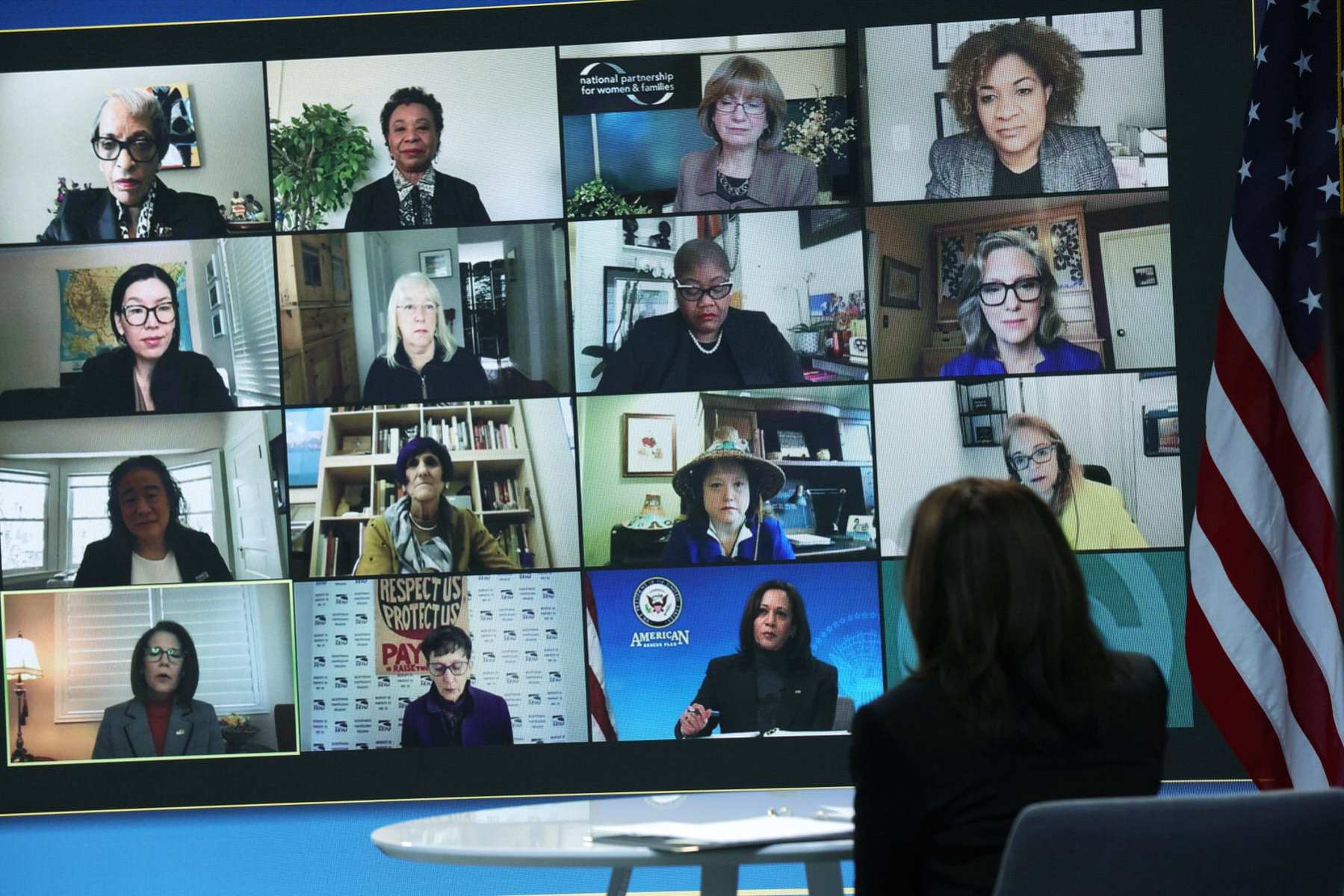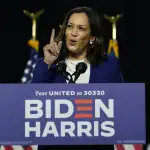Fifteen women leaders joined Vice President Kamala Harris on Thursday to lay out a plan to ensure that the relief bill moving through Capitol Hill retains the elements that would most help women — the group most severely impacted by the economic fallout of the pandemic.
In an hour-long virtual roundtable, Harris met with Reps. Rosa DeLauro and Barbara Lee and Sens. Patty Murray and Catherine Cortez Masto, as well as 11 heads of women’s advocacy organizations.
Harris laid out the three major causes of the nation’s first women’s recession. Women have dropped out of the workforce — many of them forced out due to caregiving needs — at far higher rates than men. About 2.5 million have left the labor force, some of them workers in the low-wage service jobs that have been most severely impacted by layoffs. Small businesses have also closed — one in four owned by women closed between February and April 2020. And many of those who have kept working are juggling an impossible child care burden. Half of the 400,000 jobs lost in the child care sector at the start of the pandemic have yet to return.
Harris called it “a national emergency” that “demands a national solution.”
“I know that this is personal for me; this is personal for everyone here,” Harris said. The economy cannot return, she said, if women can’t participate fully.
For Harris, who attendees said took careful notes throughout the discussion, the meeting was about building consensus. For those who attended, it was about pitching what they felt needed to remain in the $1.9 trillion American Rescue Plan proposed by the Biden-Harris administration. The plan is moving through the House for a vote in the coming days, before going to the Senate where it is likely to face more changes.
Mary Kay Henry, the president of the Service Employees International Union (SEIU), said she took away a sense of unity from the discussion — that legislators, advocacy leaders and the vice president were united around many of the same issues, including aid for child care, paid leave, food assistance and unemployment insurance.
But there is one topic that is less assured: the push for a $15 minimum wage.
So far, it’s one of the measures in the COVID-19 relief bill that has received the most pushback. At a CNN town hall earlier this week, President Joe Biden said he’s open to negotiation on how long it takes to phase in the increase, which would see the minimum wage raise gradually from $7.25 today to $15 in 2025. It’s far from clear whether the $15 minimum wage will make it into the final version of the bill.
But Henry said that most people on the call talked about the importance of the $15 minimum wage specifically. She said it would benefit her 2 million service-industry members who are employed in some of the lowest-paying occupations in the country. Harris, Henry said, didn’t cite the increase specifically.
“The unity in the House that we’re going to see this week, of the House passing the American Rescue Plan in the current form, helps create momentum in the Senate,” Henry said. “That’s a live conversation between the Republicans and some Democrats in the Democratic caucus about, ‘Will we take the House plan? Are we going to amend this in some way?’”
A significant portion of the discussion Thursday also centered on the acute needs of Black women, who saw their labor force participation plummet further than any group in 2020.
In talking about the need for that relief, Rep. Lee shared her own experience as a Black, single mother who once had to rely on public assistance to feed her young children.
“When I was raising my kids, I was on food stamps. I know what’s going on in these women’s lives, especially single moms, young women of color. They need this bridge over troubled water,” said the California Democrat. “If I hadn’t had access to food stamps and to public assistance, I don’t know what I would’ve done. I have to remind people sometimes in these forums what women are going through now. I wasn’t even in a pandemic.”
Lee, a member of the budget and appropriations committees, also focused on the $15 minimum wage, saying it would help lift Black women out of poverty.
“I said this is about saving lives and livelihoods,” Lee said. “A lot of women are doing so much at home right now, they’re juggling.”
The Congressional Budget Office has estimated that the provision would lift 900,000 people out of poverty and raise wages for 17 million people. But, it estimates, the wage increase would also lead to the loss of 1.4 million jobs.
Lee also addressed the pandemic response in the relief bill, saying she prioritized an equitable response to the vaccine rollout that addresses both the historical skepticism in Black communities and discrimination against African Americans seeking access to health care. She said she has been negotiating with House committee chairs to create a plan for community groups to hire and train trusted messengers to provide accurate information on the vaccine in underserved areas.
That also means remembering the Black women voters who were mobilized as part of the winning coalition for the Biden-Harris administration and congressional Democrats, said Melanie Campbell of Black Women’s Roundtable.
“We know that our community wants and needs this to pass, and for them to sustain making it as bold and massive as possible,” Campbell said she told lawmakers and the vice president. “We’re reminding our friends who we helped elect that we want them to work (together) and get it passed.”
The goal for the entire package, which many of the attendees agreed on, was to address the gender and racial inequities exacerbated by the pandemic in a way that creates a new normal for women and people of color, said Tina Tchen, CEO of Time’s Up, which works to combat gender-based workplace discrimination.
“This is a unique, transformational moment because of the struggle that everyone is experiencing right now,” said Tchen, who served under President Barack Obama as executive director of the White House Council on Women and Girls, the predecessor to the White House Gender Policy Council established under the Biden-Harris administration last month.
“This may be what the New Deal was almost a century ago, to really transform what our workplaces look like, and how we are invested in women as an American economy.”
Advocates and legislators said they left the meeting with a game plan for action in the coming days that puts pressure on lawmakers to make good on their promises to women and communities of color.
“I felt the urgency in my soul [after] leaving this conversation,” said Fatima Goss Graves, the president and CEO of National Women’s Law Center. “We are ready to work and they are clearly ready to work.”
As for Harris, Henry said the vice president made it clear she is also going to be more public in terms of her support for the rescue package, and specifically the provisions that affect women.
Harris recently wrote an op-ed for the Washington Post highlighting many of the points she reiterated Thursday and telling the stories of working women.
“Some have said that our plan is too big,” Harris wrote. “But as the president has put it, ‘The biggest risk is not going too big, it’s if we go too small. The pandemic has created a perfect storm for women workers, but it’s different than a hurricane that has come and gone. It’s still raging. The longer we wait to act, the harder it will be to bring those millions of women back into the workforce.”
More of that can be expected, Henry said.
“The sense that she gave was she’s going to become much more public in terms of op-eds, interviews and convening with people impacted to shine a light,” she said, “and keep the heat on about the urgent need to act.”





